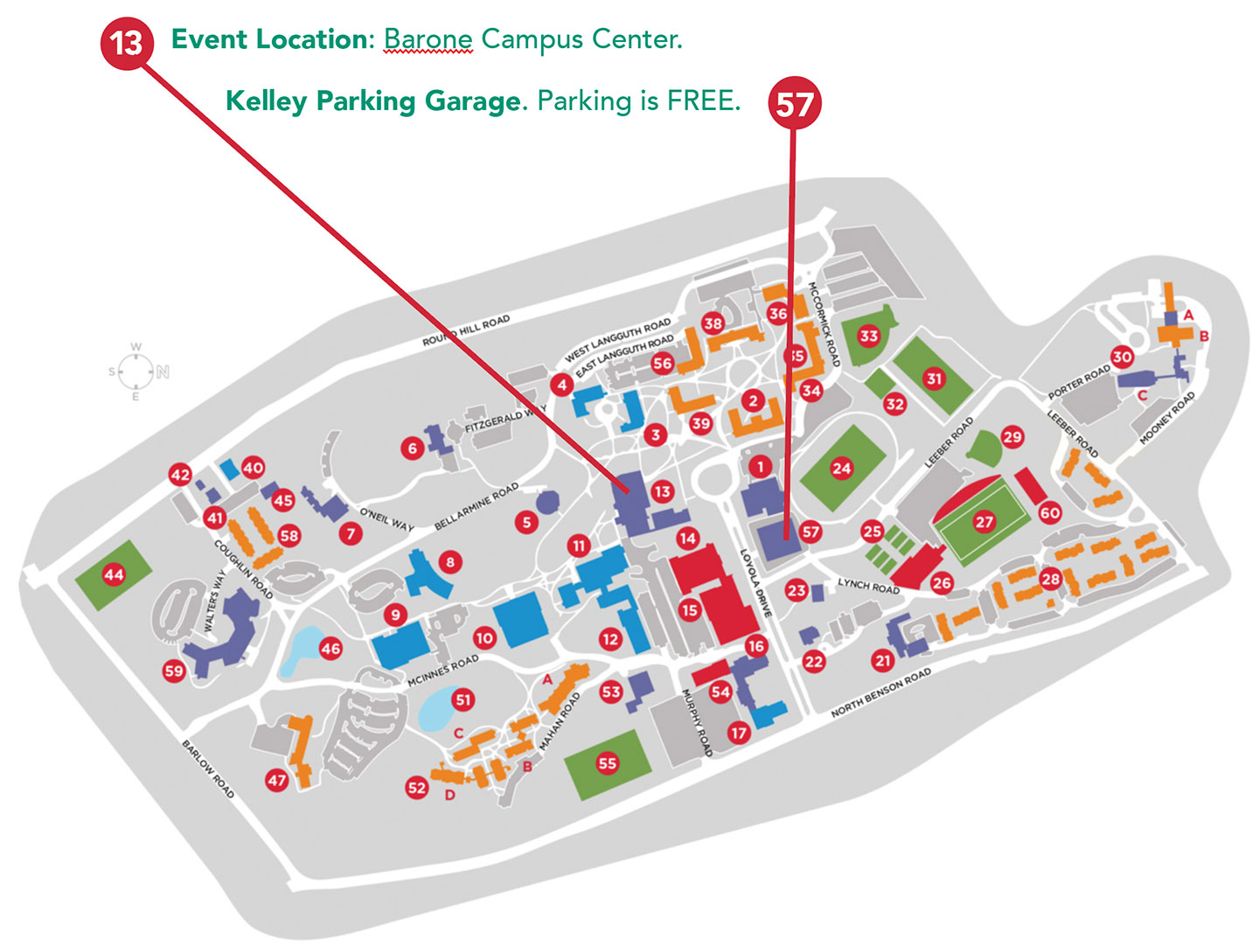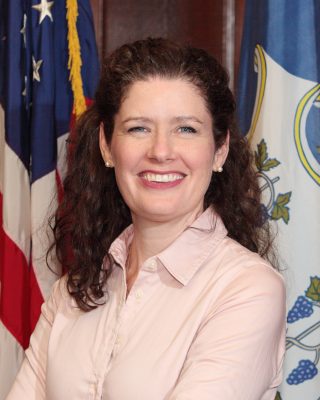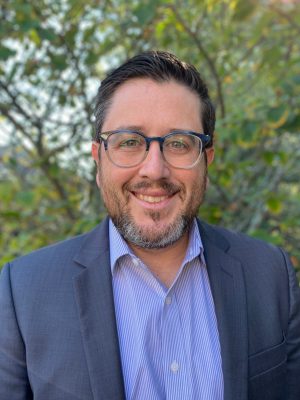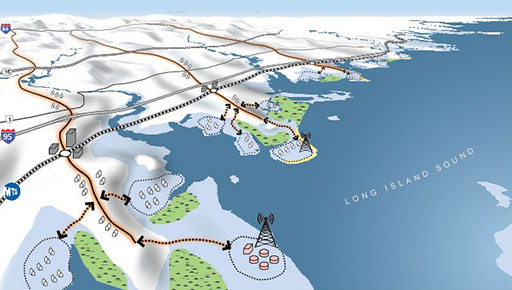Resilient Connecticut Climate Adaptation Summit
Tuesday, November 12, 2019
9:00 am – 4:00 pm
Located at Fairfield University
At CIRCA's first annual Resilient Connecticut Summit, Commissioner Katie Dykes from Connecticut’s Department of Energy and Environmental Protection provided a welcome and Shaun O’Rourke, Rhode Island Chief Resiliency Officer gave a keynote address entitled, Resilient Rhody: Building Climate Resilience in Rhode Island.
Materials
Summit Program |
Draft Resilient Connecticut Planning Framework |
Group Presentations in Agenda Order
(note: more presentations can be found after breakout summaries below)
Resilient Connecticut Project Overview and Progress_John Truscinski
Keynote Address_Shaun O'Rourke
Stakeholder Engagement and Capacity Building_Miriah Kelly
Agenda
| 9:00 - 9:30 AM | Registration (coffee provided) |
| 9:30 - 9:45
|
Welcoming Remarks
|
| 9:45 - 10:15
|
Welcome Address
|
| 10:15 - 11:45
|
Progress Toward a Resilient Connecticut
Moderated by John Truscinski, CIRCA Director of Resilience Planning
|
| 11:45 - 12:15 | Lunch (provided) |
| 12:15 - 12:45
|
Keynote Address
|
| 12:45 - 1:15
|
Resilient Connecticut Stakeholder Engagement and Capacity Building
|
| 1:15 - 1:30 | Break |
| 1:30 - 3:45 | Breakout Sessions: Developing Capacity and Building Resilience Tools for Connecticut
(Breakout Session Summaries are below the Agenda.) |
Track Topics and Timing |
1:30 - 2:30 (Session A) |
2:45 – 3:45 (Session B) |
| Track 1 (Oak Room) Regional resilience planning |
Resilient Transit Oriented Development | Integrated Flood Risk Planning |
| Track 2 (Room 200) Climate and public health |
Drinking Water Vulnerability | Climate and Health in Connecticut |
| Track 3 (Dogwood Room) Technical tool development |
Vulnerability Assessment Demonstration and Application | Zones of Shared Risk Charette |
| 3:45 – 4:00 | Closing Remarks and Next Steps
Alex Felson, CIRCA Deputy Director and Director of Resilience Design |
Breakout Session Summaries
Session A (1:30 - 2:30)
Track 1 – Resilient Transit Oriented Development
Summary: Coastal adaptation will be expensive and complicated and often implicates private property, public spaces, infrastructure and state concerns. Framing climate adaptation as an economic development approach positions costly adaptation investments as urban redevelopment and provides value-added solutions for municipalities. This session will feature a presentation and discussion on the concept of “Resilience Corridors”. Resilience corridors combine transit-oriented development (TOD) as an investment framework, configured as a corridor reinforcing evacuation routes, thus aligning economic investment with egress linking critical facilities (hospitals, fire stations, power generation), utilities and infrastructure, and other forms of emergency preparedness and disaster management strategies into investment zones. The resilience corridor creates an urban development strategy that the state can target to avoid investing in project areas with repetitive flood loss homes or low-lying areas that provide short-term value.
Facilitator: Alex Felson, CIRCA Deputy Director and Director of Resilience Design
Panelists:
- Norman Garrick, Professor, UConn Department of Civil and Environmental Engineering
- David Kooris, Deputy Commissioner, Connecticut Department of Economic and Community Development
- David Elder, Supervising Transportation Manager, Connecticut Department of Transportation
Track 2 – Drinking Water Vulnerability
Summary: With changing precipitation patterns, sea level rise, and drought anticipated in the coming decades, state officials and local planners are considering ways to address the impacts of climate change on Connecticut’s drinking water supply. This session will feature remarks from Lori Mathieu, Public Health Section Chief at the Connecticut Department of Public Health. The session will also include an overview of recent climate trends and projections for precipitation patterns and how these will impact water systems state-wide, highlights from Connecticut’s new Drinking Water Vulnerability Assessment and Resilience Plan, survey feedback from community water systems managers, recommendations for regional drinking water resilience, and discussion of upcoming water system vulnerability assessment requirements of America’s Water Infrastructure Act.
Facilitator: Katie Lund, CIRCA Director of Engagement
Panelists:
- Lori Mathieu, Public Health Section Chief, Connecticut Department of Public Health, Drinking Water Section
- David Murphy, Manager of Water Resources Planning, Milone & MacBroom
- Christine Kirchhoff, Professor, UConn Department of Civil and Environmental Engineering
Track 3 – Vulnerability Assessment Demonstration and Application
Summary: An understanding of the spatial nature of an area’s physical, biological, and social characteristics is needed to identify strategies for responding to sea-level rise. To meet this need, the Resilient Connecticut project is developing a spatial index-based approach to model vulnerabilities for Connecticut coastal towns in multi-scale and with multi-criteria. This session will describe the methodology and application of CIRCA’s interactive vulnerability assessment beta-viewer. A demonstration will be given to show how impacts are reflected in bio-physical and social vulnerabilities that affect a selected coastal, regional, city, or even a user-defined area. The demonstration uses GIS layers illustrating spatial information including coastal exposure, natural habitats, salt water intrusion, critical facilities, and transportation networks. Jessica LeClair from Sustainable CT joins as a panelist to highlight how their certification program addresses resiliency and municipal vulnerability assessment. Panelists and the audience will then discuss benefits and concerns about this tool for regional, municipal, and site scale planning to help tackle the challenges of future sea-level rise and associated flooding.
Facilitator: Joanna Wozniak Brown, Senior Resilience Planner, CIRCA
Panelists:
- Jessica LeClair, Program Manager - Community Engagement & Outreach, Sustainable CT
- Yaprak Onat, Assistant Director of Research, CIRCA
- Caterina Massida, Data Analyst, CIRCA
Session B (2:45 - 3:45)
Track 1 – Integrated Flood Risk Planning
Summary: Integrated flood risk analysis is a decision support tool to guide flood management policies and improve flood mitigation activities. This session will overview a framework for regional, municipal, and site scale planning to tackle the challenges of future storms, sea-level rise, and riverine flooding. CIRCA will present an approach to representing riverine and coastal flood extents using fine-scale resolution flood modeling of extreme rainfall, tidal elevation, storm surge, currents, surface waves, and projected sea surface elevations including validation with real-time water level measurements. A facilitated session will include a panel discussion with experts to address needs that support flood risk planning.
Facilitator: Yaprak Onat, CIRCA Assistant Director of Research
Panelists:
- Emmanouil Anagnostou, Professor, UConn Department of Civil and Environmental Engineering
- James O’Donnell, Professor, UConn Department of Marine Sciences and CIRCA Executive Director
- Jeff Caiola, Assistant Director of Land and Water Resources Division, CT DEEP
-
Sheila Warren, USACE New England District (NAE) Planning Division - NAE Silver Jackets Coordinator
Track 2 – Assessments and Gaps in Knowledge of Climate and Health in Connecticut
Summary: Coordination between public health professionals, climate and health stakeholders, and university researchers is needed to address the impacts of climate change on the health of Connecticut’s vulnerable populations and to develop strategies to promote health resilience. This session will feature a brief presentation of climate and health assessments for Connecticut and a roundtable discussion of current climate and health research activities and needs for Connecticut, as well as data gaps. It is geared towards individuals and organizations that are currently, or wish to be, engaged in research and assessment activities of climate and health in Connecticut.
Facilitator: John Truscinski, CIRCA Director of Resilience Planning
Panelists:
- Laura Bozzi, Director of Programs, Yale Climate and Health Initiative
- Laura Hayes, Epidemiologist, Connecticut Department of Public Health
Track 3 – Zones of Shared Risk Charette
Summary: A Zone of Shared Risk is an area of land with groups of people who face common challenges to climate change. This can include the houses, land, infrastructure, hydrology, ecology, and social elements. Risks are often shared among or between groups of people that may have different perspectives and priorities for coastal resilience. This session will include an overview of the approach to identifying zones of shared risk using historical information, elevation models, flood projections, transportation, land use, social characteristics, and urban and ecological systems. The session will present three towns as a case study and have an interactive feedback session about risks and opportunities for overlapping systems that contribute to zones of shared risk.
Facilitator: Alex Felson, CIRCA Deputy Director and Director of Resilience Design
Panelists:
- Peter Miniutti, Associate Professor & Director of UConn’s Community Research & Design Collaborative
- Mariana Fragomeni, Post-doctoral Scholar at UConn’s Community Research & Design Collaborative
- Tao Wu, Ph.D. Student at UConn’s Department of Plant Science & Landscape Architecture
- Natalie Miniutti, Instructor at UConn’s Department of Plant Science & Landscape Architecture
Slides in order of breakout topic and presenters:
| Resilient Transit Oriented Development | Resilient Corridor TOD Presentation_Alex Felson and Norman Garrick |
| Drinking Water Vulnerability | DPH Drinking Water Section and Resilience_Lori Mathieu
Drinking Water Vulnerability Assessment and Resilience Plan_David Murphy
Water Systems Preparing for a Changing Climate_Christine Kirchhoff |
| Vulnerability Assessment Demonstration and Application | Vulnerability Assessment Demo and Application_Yaprak Onat
|
| Integrated Flood Risk Planning | Integrated Flood Risk Planning_Yaprak Onat
|
| Climate and Health in Connecticut | CT DPH State Health Assessment_Laura Hayes |
| Zones of Shared Risk Charette | Zones of Shared Risk Charette_Peter Miniutti |
Location & Directions
Fairfield University
Barone Campus Center, Oak Room
1073 N. Benson Road, Fairfield, CT
Fairfield University Campus Map
The campus map, below, shows the ideal location to park and the building the Summit will be held. Additional directions and campus facilities can be found on the Fairfield University website.

Interactive Campus Map
Funding for this project is provided by the United States Department of Housing and Urban Development through the Community Block Grant National Disaster Recovery Program, as administered by the State of Connecticut’s Department of Housing.


WELCOME ADDRESS
Katie Dykes was nominated by Governor Ned Lamont to serve as the Commissioner of Connecticut’s Department of Energy and Environmental Protection (DEEP), and was confirmed on February 20, 2019. Katie previously served as Chair of the Connecticut Public Utilities Regulatory Authority (PURA) from 2015-2018, and as Deputy Commissioner for Energy at Connecticut DEEP from 2012-2015. Katie joined CT DEEP in March 2012 after prior service as Deputy General Counsel for the White House Council on Environmental Quality and as a Legal Advisor to the General Counsel for the U.S. Department of Energy. She is a graduate of Yale College and the Yale Law School.

KEYNOTE ADDRESS
Shaun O’Rourke is Director of Stormwater and Resiliency at Rhode Island Infrastructure Bank and Chief Resilience Officer for the State of Rhode Island. Prior to joining RIIB, Shaun served as the National Green Infrastructure Director at The Trust for Public Land and was Director of Sustainable Design at the Boston Architectural College, where he continues to serve as a member of the faculty. He has also worked at AECOM in New York City as an Ecological Designer focusing on public sector infrastructure projects. Shaun holds a Master of Landscape Architecture degree from SUNY College of Environmental Science and Forestry and a B.S from University of Vermont.
LOCATION
Fairfield University
Barone Campus Center, Oak Room
1073 N. Benson Road, Fairfield, CT
CONTACT
John Truscinski, CIRCA Director of Resilience Planning
| Phone: | 860.405.9252 |
|---|---|
| E-mail: | john.truscinski@uconn.edu |
